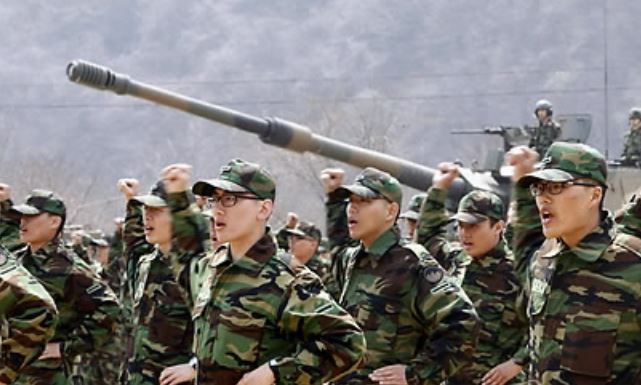South Korea said Friday that it will push for an agreement with the US in May on their envisioned combined command in preparation for the wartime operational control transition.
The move is part of the defense ministry's roadmap on procedures necessary to regain its OPCON from the US as early as possible.
The allies have agreed to seek a "conditions-based" transition tied to South Korea's own defense capability and the development of North Korea's weapons of mass destruction.
The liberal Moon Jae-in administration hopes for a transfer by the early 2020s.
A key issue is to how to replace the allies' Combined Forces Command, the backbone of their joint defense system.

South Korea pushed for a deal on the so-called future combined command in their annual defense ministerial talks held last October, but they failed to reach an agreement.
Officials at the Ministry of National Defense said it does not mean a "big difficulty."
"There's no stumbling block to the shift in the commanding structure and assessing the initial operational capability as planned," a senior ministry official told reporters.
He was briefing them on the ministry's policy report to Prime Minister Lee Nak-yon earlier in the day.
The ministry reported to Lee that it will push for an accord on the future combined command system when the chairman of South Korea's Joint Chiefs of Staff holds a pre-Military Committee meeting with the commanding general of the US Forces Korea (USFK) in May.
The USFK chief, currently Gen. Vincent K. Brooks, also serves as leader of the existing CFC and the United Nations Command.
South Korea also wants to skip the pre-IOC evaluation slated for 2019 to conduct the IOC assessment that same year.
As to the defense reform scheme, the ministry reaffirmed its plan to reduce the number of South Korean troops to half a million by 2022.
The mandatory service period of rank-and-file soldiers will be shortened to 18 months in stages from the current 21 months, according to the ministry's report to the prime minister on its 2018 policies.
South Korea has 620,000 troops, including 483,000 Army service members, compared to North Korea's 1.1-million armed forces.
The Moon government has campaigned for the so-called defense reform 2.0 aimed at making the nation's military smaller but stronger.
It is seeking to expand the employment of civilians for non-combat missions, with more active-duty soldiers assigned to field operations. The number of general-grade officers, currently totaling around 430, will be adjusted. Some expect it to decrease by 70-80.
The ministry plans to complete a master plan for military reform by April for speedy legislative procedures.
On agreed-upon military dialogue with North Korea, the ministry said it plans to start with working-level talks.
"(We) are preparing for consultations with a focus on the easing of military tensions and creating peaceful circumstances," it said.
One of the most pressing issues is cross-border travels by the North's delegation to next month's PyeongChang Winter Olympics.
The ministry also revealed plans to strengthen the alliance with the US against the North and expand its military diplomacy to improve relations with other countries.
In a related step, the ministry will update a joint comprehensive counter-missile operation plan with the US, known as the 4D Operational Concept, to detect, disrupt, destroy and defend against North Korean missile threats, including nuclear, chemical and biological warheads.
South Korea is scheduled to join the Nimble Titan war game, an international missile defense exercise hosted by the US, to be held in March, May and September, added the ministry.
"(We) are also pushing for participation in the PSI drills to open in Japan in July this year," it said.
PSI stands for Proliferation Security Initiative (PSI), which is a global effort that aims to stop trafficking of weapons of mass destruction, their delivery systems, and related materials to and from states and non-state actors of proliferation concern.
In the latter half of this year, the second South Korea-US counter-WMD committee meeting will be held in the US.
The ministry said it will try to broaden Seoul's defense ties with China, Russia and Southeast Asian countries.
Defense Minister Song Young-moo is considering a trip to Singapore, Indonesia and Thailand in January or February. (Yonhap)



















![[Today’s K-pop] Treasure to publish magazine for debut anniversary](http://res.heraldm.com/phpwas/restmb_idxmake.php?idx=642&simg=/content/image/2024/07/26/20240726050551_0.jpg&u=)